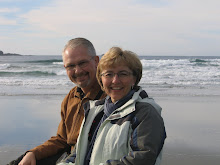Back in July, in Paraguay, at Mennonite World Conference 2009, speakers from almost all of the major church groups around the world brought their greetings. While we all have our unique approach to being Christian, I was marvelling at this strong statement of commitment to work together. Then the Lutheran Church representative came up. One could have missed what he had to say if one was engaged in a side conversation with a new (or old) friend from a completely different place on our planet that just sat down in the chair next to you. Let me just give the quote about this historical event as taken directly from the Mennonite World Conference website.
"Asunción, Paraguay—A moving gesture of reconciliation and strong preaching marked Assembly 15’s first full day, on Wednesday, July 15.
Ishmael Noko, general secretary of the Lutheran World Federation (LWF), addressed the gathering with a “heavy heart,” he said, because of the “painful history” Lutherans and Mennonites share, especially the persecution – and execution – of Anabaptists in the 16th century.
“This history of condoning persecution," he said, "is a spiritual wound we [Lutherans] carry around in us." He further described the condemnations of Anabaptists, contained in the “anathemas” of the Augsburg Confession, as “the poison of a scorpion.” The Anabaptists did not strike back, he said; “we have it in us.”
“We were wrong, regrettably wrong,” he said. “Execution was not the only choice, even then.”
In recent years, Mennonites and Lutherans have been in dialogue about these matters, and Lutherans are seeking a “healthier” continuing dialogue now, said Noko, “as we address how we condemned you.” At their meeting in 2010, the LWF will be asked “to take action which will put us in a new position to the anathemas and express our deep repentance and regret.”
The assembled Mennonites reacted spontaneously to Noko’s words by standing and applauding.
MWC president Danisa Ndlovu also responded. “What we have heard will change our lives and perspectives,” he said.
“We are witnessing the breaking of walls,” he continued. “We are ready to receive the words we have heard.” The two men then embraced.
Ironically, these representatives of Anabaptists and Lutherans are both from Zimbabwe. Ishmael Noko's mother, in fact, was a Brethren in Christ woman who married a Lutheran. Said Larry Miller, MWC general secretary, "Divine providence has brought these [two men] together." End of quote.
Just to say a little more about the irony of who is carrying forward the reconciliation; these are two Zimbabweans, leading the healing process of disastrous times for European Christians. If the Mennonite Church had started in Africa, history may have taken an entirely different course, and this reconciliation may have never been necessary.
Well, this blog entry has been prompted by a praise item in the November 2009 edition of the Mennonite Church Canada Witness PrayerNet (to which you can subscribe - or may already). I quote, "We are grateful that God’s promises of reconciliation shine brightly in a damaged world! The Lutheran World Information (LWI) Council has unanimously adopted a statement asking forgiveness from Mennonites for a legacy of violent persecution. The statement expresses “deep regret and sorrow" for the past and asks forgiveness, “from God and from our Mennonite sisters and brothers.”
Praise the Lord for his hand of reconciliation! A similar process also took place with the Reformed Churches back in ... I'm still looking for when and where this happened, but it was only a few years ago.

